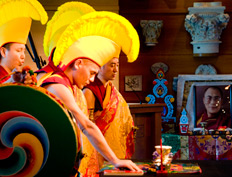Events
March 25, 2011
Tibet Week encourages thoughtful debate

Lively intellectual debate will take center stage at Emory's Tibet Week from March 28 to April 2.
The 11th annual event, an outgrowth of the Emory-Tibet Partnership, fosters dialogue between Western and Tibetan Buddhist traditions in science, philosophy, arts and culture.
This year's lineup features demonstrations of mandala sand painting and butter sculpture, guided meditation workshops for adults and children, a panel on the future of Tibet and two debates involving Tibetan monastic students in residence at Emory this year.
"Debate is one of the primary tools used in monastic education," says Geshe Lobsang Tenzin Negi, director of the Emory-Tibet Partnership. A precisely choreographed routine, debate is believed to help sharpen the mind and promote internal clarity.
The first debate begins at 7:30 p.m. on Monday, March 28. Monastic students, along with monks from Drepung Loseling Monastery in Atlanta, will demonstrate specific techniques.
During a "Buddhism and Science" debate on Thursday, March 31 at 7:30 p.m., the monks will be joined by Emory faculty and students in Buddhist studies and the sciences to debate concepts of evolution, karma, reincarnation and ethics.
Both events will be held in the Carlos Museum Reception Hall.
Tibet Week coincides with the Third International Conference on Science Translation into Tibetan, where faculty and translators will gather to discuss translating complex modern scientific concepts, such as neuroplasticity, into Tibetan.
"This is a wonderful service and one of the most important visions of His Holiness the Dalai Lama," says Dawa Tsering, a Tibetan who is pursuing a bachelor's degree in physics at Emory under an exchange scholarship with the Institute of Buddhist Dialectics in Dharamsala, India.
Changing Political Landscape
Earlier this week, thousands of Tibetans across the world voted for a new Prime Minister of the exiled Tibetan government. Students for a Free Tibet will present a panel discussion, "Will Tibet Survive," at 7:30 p.m. on Friday, April 1 in the Carlos Museum Reception Hall.
Leading Tibetan activist Jamyang Norbu will argue for Tibet's complete independence from China, while Lobsang Nyandak, the Dalai Lama's representative to the U.S., will present the Dalai Lama's "Middle Way" approach, emphasizing equality and mutual cooperation.
"This is a very exciting event and very timely," notes Negi, a senior lecturer in the Department of Religion.
Students planned the discussion before the Dalai Lama's announcement earlier this month that he would be stepping down as political head of the Tibetan government-in-exile. The announcement does not impact Emory's relationship with the Dalai Lama or with partner institutions in India, according to University administrators.
"Tibet Week is a full, beautiful display of how far Emory has come over the 10-plus years of relationships with Tibetan colleagues and friends," says Tara Doyle, senior lecturer in the Department of Religion and director of the Tibetan Studies semester study abroad program in India.
The Emory-Tibet Partnership enjoys cross-departmental support, says Elizabeth Hornor, Marguerite Colville Ingram Director of Education for the Carlos Museum.
Along with hosting Tibet Week, the museum will have an April 1 talk on artistic representations of the Buddhist concept of the Bodhisattva.
In January 2012, the Carlos will present "The Perfect Circle: The Mandala in Tibetan Buddhism," an exhibit honoring the sacred art from Thangka paintings of mandalas to three-dimensional metal installations.
Most Tibet Week events are free and open to the public. View the complete schedule.
